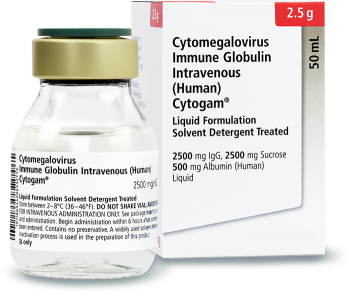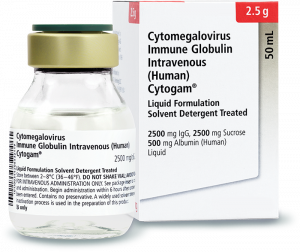

Product Information
Indication1
Cytomegalovirus Immune Globulin Intravenous (Human) (CMV-IGIV) is indicated for the prophylaxis of cytomegalovirus
(CMV) disease associated with transplantation of kidney, lung, liver, pancreas, and heart. In transplants of these
organs other than kidney from CMV seropositive donors into seronegative recipients, prophylactic CMV-IGIV should
be considered in combination with ganciclovir.
Product Description1
Cytogam® Cytomegalovirus Immune Globulin Intravenous (Human) is an immunoglobulin G (IgG) containing a standardized
amount of antibody to CMV.
• CMV-IGIV is formulated in final vial as a sterile liquid.
• The globulin is stabilized with 5% sucrose and 1% albumin (Human).
• Cytogam contains no preservatives.
• Cytogam is supplied in a 50 mL single-dose vial (50 mg/mL).
• Cytogam should be stored between 2-8°C (36-46°F) and used within 6 hours after entering the vial.
| NDC Code | Size | Concentration | ||
|---|---|---|---|---|
|
50 mL vial | 50 mg/mL |
Dosage and Administration1
Dosage
Dosing is based on body weight. The maximum recommended total dosage per infusion is 150 mg Ig/kg, administered
according to the following schedule:
| Type of Transplant | Kidney | Liver, Pancreas, Lung, Heart |
|---|---|---|
| Within 72 hours of transplant | 150 mg/kg | 150 mg/kg |
| 2 weeks post transplant | 100 mg/kg | 150 mg/kg |
| 4 weeks post transplant | 100 mg/kg | 150 mg/kg |
| 6 weeks post transplant | 100 mg/kg | 150 mg/kg |
| 8 weeks post transplant | 100 mg/kg | 150 mg/kg |
| 12 weeks post transplant | 50 mg/kg | 100 mg/kg |
| 16 weeks post transplant | 50 mg/kg | 100 mg/kg |
Administration
Cytogam is for intravenous infusion only. Infusion should begin within 6 hours after entering the vial and should be
complete within 12 hours of entering the vial.
Vital signs should be taken preinfusion, mid-way and post-infusion as well as before any rate increase.
Initial Dose:
• Administer intravenously at 15 mg Ig/kg/hr.
• If no adverse reactions occur after 30 minutes, the rate may be increased to 30 mg Ig/kg/hr.
• If no adverse reactions occur after a subsequent 30 minutes, then the infusion may be increased to 60 mg Ig/kg/hr
(volume not to exceed 75 mL/hr).
• DO NOT EXCEED THIS RATE OF ADMINISTRATION.
The patient should be monitored closely during and after each rate change.
Subsequent Doses:
• Administer at 15 mg Ig/kg/hr for 15 minutes.
• If no adverse reactions occur, increase to 30 mg Ig kg per hr for 15 minutes.
• Then increase to a maximum rate of 60 mg Ig/kg/hr (volume not to exceed 75 mL/hr).
• DO NOT EXCEED THIS RATE OF ADMINISTRATION.
The patient should be monitored closely during and after each rate change.
Infusion:
• Cytogam should be administered through an intravenous line using an administration set that contains an in-line
filter and a constant infusion pump.
• Predilution of Cytogam before infusion is not recommended.
• Cytogam should be administered through a separate intravenous line.
Storage and Handling1
Cytogam should be stored between 2-8°C (36-46°F) and used within 6 hours after entering the vial. Do not freeze.
Do not use after the expiration date.
For Cytogam product inquiries, call 833-779-2614



